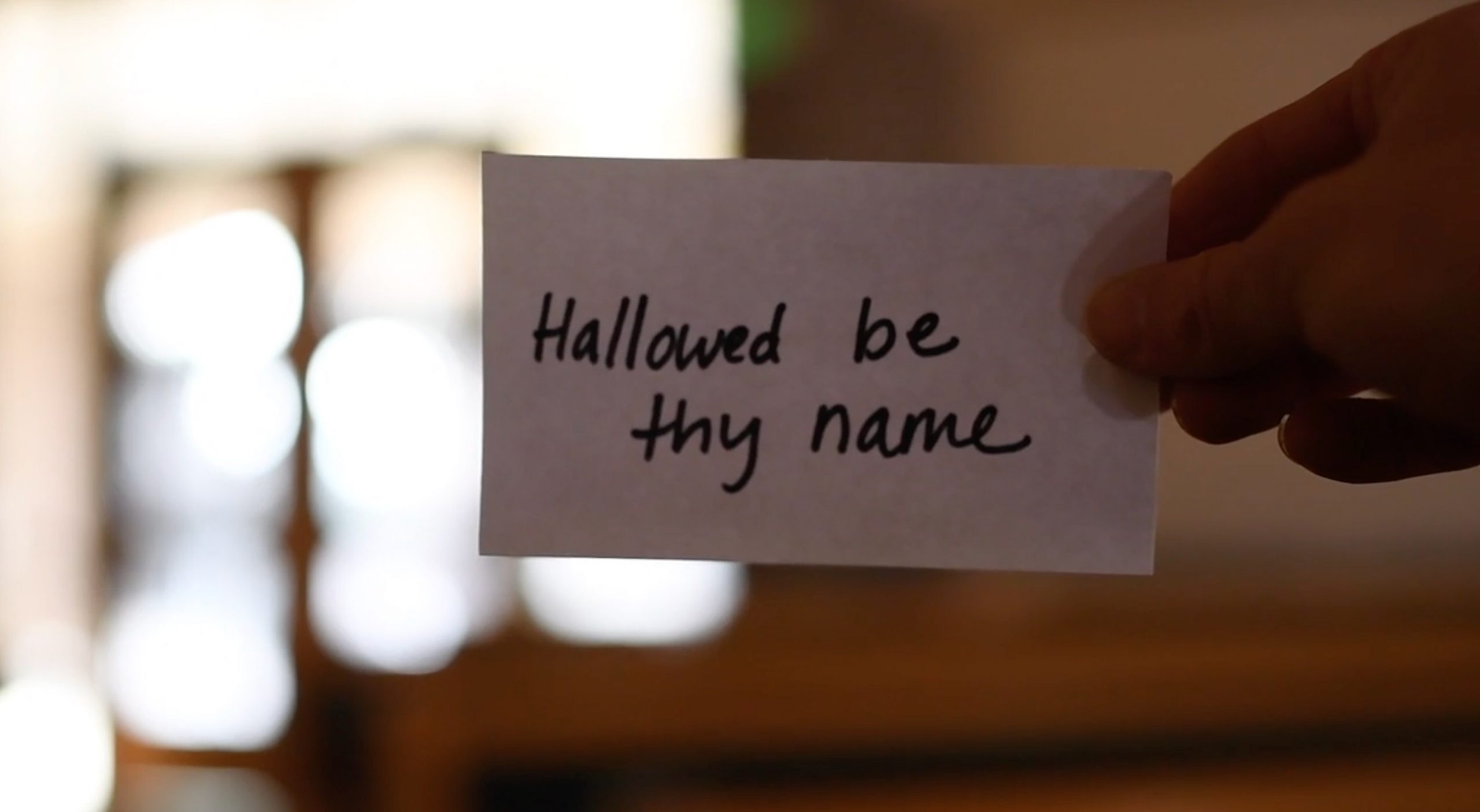Jan 30th, Hallowed Be Thy Name – Beauty, with Rev. Kally Elliott
A Part of the Series:
Rev. Kally Elliott
Other Articles in:
Hallowed Be Thy Name – Beauty, with Rev. Kally Elliott.
As a teenager, I spent many of my evenings gathered around my grandmother Gigi’s dinner table with my brothers, mother, father, aunt, uncle, cousins and grandfather. Because my family was made up of choir directors, choir members and other musicians, we couldn’t say Grace like a normal family. Instead, we held hands and sang the Doxology. Praise God from whom all blessings flow. Praise God, all creatures here below. Praise God above Ye heavenly hosts, Praise Father, Son, and Holy Ghost. Amen.
And we sang it in four part harmony. Shortly after I began dating my would-be husband, he joined us for dinner at Gigi’s House. And just as he was about to pick up his fork and dig into the roast beef set before him, I grabbed his hand on his right, and my aunt grabbed his hand on his left, and the family began belting out the Doxology. Now, my husband had never heard this Doxology we were singing.
The poor guy just wanted to eat his roast beef. But to this day, my husband and I continue this practice with our own family. Before anyone can eat, we grab each other’s hands and we sing. My kids roll their eyes and groan, but they mostly do it. They hold each other’s hands, often pinching or arm wrestling at the same time, and they sing.
It’s a practice that holds meaning for me, and I hope for them, too. Some nights I end the practice frustrated with my eye-rolling, arm-wrestling teenagers. Sometimes I don’t think much about what I’m singing. But I often find myself grateful for this family, for the food, for the God who continues to be faithful to us. Harvard professor and Minister of the Memorial Church, Michael Potts said, “the thing about spiritual practices is that we commit to them”.
Some days they yield great gifts. Some days the gift they yield is our commitment. The Lord’s Prayer, which we have been studying in this sermon series, is like that. It’s a spiritual practice. Many Sundays, as we pray the prayer together, my mind wanders.
I know the words. I can recite them without giving much thought to what I am saying. But sometimes, as I pray the words of the prayer Jesus taught his disciples, I’m overwhelmed with the consequence of our words, leading us into creative action with God. Today, we are focusing on the line, Hallowed be Thy name. Now I’ve heard people ask if Howard is God’s name, as in Our Father who art in heaven, Howard be your name.
And as much as I am tempted to call God Howard, when the disciples asked Jesus to pray, he says, it’s Hallowed, hallowed be Thy name, not Howard. To Hallow something is to make it Holy. Our Father, who art in heaven, your name be Holy. Your name is Holy. You are Holy.
Names are important in the thought world of the Bible. Names were much more than labels of identification. They were expressions of the essential nature of the name’s bearer. In a smaller way this is still true today. In 2012, Hurricane Sandy hammered Long Island.
When our family moved there three years later, they were still rebuilding from the catastrophe. Not long after Sandy, a New Yorker cartoon showed a man and his wife standing in what is obviously their living room with a couch and a TV in the background, and they are standing in knee deep water in their living room. They obviously ignored the evacuation order. And the man says to his wife, “if they want us to take these storms seriously, they’re going to have to start giving them scarier names”. Maybe any Hurricane over like Category Three should be called Voldemort or Godzilla rather than friendly names like Katrina, Ida, or Sandy, because names communicate meaning and being and identity, especially in the thought world of the Bible.
The Jewish name for God was Yahweh, and it was not spoken because it was too Holy. Instead, it was breathed Yahweh with every breath. The people of Israel hallowed God’s name, and we can do this too, paying attention to our own breath or protecting the breath of others. But Jesus taught that God is as intimate as a father or a mother. It’s a paradox of sorts.
God is infinitely Holy and set apart, and yet God is as close to us as a loving parent, our Father, our mother, our loving parent who is in heaven. Holy be your name. In starting our prayer this way, we remember God’s loving and Holy essence. But we also practice adoration and praise for God’s loving and faithful and Holy essence. Now, I don’t always feel like giving thanks or praising for remembering the goodness of God, but that’s exactly when the practice becomes important, when the commitment is the gift.
In the Jewish tradition, there is a practice of naming 100 blessings every single day. 100. If you figure the average person is awake for 16 hours a day, that means that every ten minutes you have to come up with another reason to be grateful. What is even more incredible is this practice was instituted in the time of King David in response to a terrible plague which killed 100 people every day. Believing the plague had a spiritual cause, King David and the sages instituted a measure for measure response, the saying of 100 blessings each day.
When my family gathered for my grandmother Gigi’s Memorial service, we were all deeply sad. Gigi was the person who showed our family, each one of us, what love felt like. None of us were ready to say goodbye. But in the depths of our sorrow, we once again grabbed the hand of the brother or the sister or the aunt or uncle or mother or father next to us. And we began to sing Praise God, from whom all blessings flow.
Praise God, all creatures here below. Praise God above Ye heavenly hosts. Praise God, the Son, and Holy Ghost. Amen. In the midst of grief, the practice of holding hands and singing praise anchored us, and the song of gratitude we had sung so many times before poured from our hearts.
For me that was an experience of Holiness, of beauty, a moment set apart to remember that we belong to a God who holds us in life and in death. Many of the great hymns of the Church have been written during a time of loss and grief, and yet the authors of these hymns pour out praise to God. Halloween, God’s name. I think of the famous hymn It Is Well With My Soul, written by Presbyterian elder Horatio Stafford, who found himself traveling on a ship to meet his wife who had survived a shipwreck that had killed his four daughters. One particular day during the voyage, the captain summoned him to the bridge of the vessel, pointing to his charts, and he explained that they were then passing over the very spot where his family’s ship had sunk and where his daughters had died.
It is said that Spafford returned to his cabin and wrote the hymn, It is Well With My Soul There. And then one of the lines singing, Praise the Lord, praise the Lord, O my soul. Now there are other accounts that say it was written at a later date, but obviously the voyage was one of deep suffering and yet is the clear inspiration of the moving hymn. The people gathered to hear Jesus teach them to pray also knew great loss and hardship. The Gospel of Matthew says, Jesus went throughout Galilee teaching in synagogues and proclaiming the good news of the Kingdom, curing every disease and every sickness among the people, and they brought to him all the sick, those who were afflicted with various diseases and pains, demoniacs, epileptics and paralytics, and he cured them.
These are the people gathered on the mountain with Jesus as he teaches what we’ve come to know as the Lord’s Prayer. These are the people who know grief, who have experienced hardship, who have lived hunger and disease and loss. And Jesus says, when you pray, begin with remembering that you belong to God and that God’s name is Holy. Begin with praise. It reminds me of the story of Paul and Silas in the book of Acts Chapter 16.
They are on their way to a prayer meeting of sorts when they happen along a girl being trafficked. Paul and Silas rescue the girl, angering the men who had enslaved her. The men then drag Paul and Silas to the authorities and have them stripped of their clothing, beaten and thrown into prison with their feet fastened into the stocks. Acts 16 continues the text, saying, about midnight, Paul and Silas were praying and singing hymns to God, and the prisoners were listening to them. Here they are in a dark, dank prison, naked, beaten, bleeding, their feet chained to the ground, and they are praying and singing hymns, singing hymns in prison.
Who knows what their future holds if they even have a future. And they are singing hymns. I mean, who does that? But then who sings the Doxology at their grandmother’s funeral? Who writes lyrics about it being well with one soul after their four children perish at sea?
I don’t have an answer, except that I think it’s born out of practice. And from that place the rest of our prayers of our heart overflow.
When Paul and Silas were singing hymns and praying in the prison cell, they were making a willful choice to remember the Holy nature of God to whom they belong, the power and the intimate love of their God. It was their way of crying out, saying, God, you say you love us and that we belong to you, so help us. You say you are faithful to us, what we need you right now. You say that you free the captives. We are those captives. Show up, God.
That is the subtext of their prison cell Hymnsing. The next verse reads, Suddenly there was an earthquake so violent that the foundations of the prison were shaken, and immediately all the doors were opened and everyone’s chains were unfastened. But Paul and Silas did not run. Instead, they remained, and one thing led to another, and by the morning they were not only free but were baptizing the prison warden and his entire family. Paul went on to write letters of encouragement and instruction to the Church scattered in cities all over the Greco Roman world.
Many of his letters contain prayers, but one of the most famous prayers is in Ephesians Three, and it goes like this. For this reason, I kneel before the Father from whom every family in heaven and on Earth derives its name. It’s a mirror image of Jesus’ words, Our Father, who art in heaven, hallowed be thy name. It’s just written in Paul’s way of speaking. He ends this same prayer with to him who is able to accomplish abundantly, far more than we can ask or imagine to him be the glory.
And in between the praise at the beginning and the praise at the end, Paul pours out his heart to God. But here’s the thing. This prayer is written from prison. The place that Paul is kneeling before God to write this prayer is within the four walls of a prison cell. He is dragging a piece of heaven into his dark corner of the world, and it is a gritty, defiant act of resistance to the horror that surrounds him.
Now. I don’t believe that we should deny pain or hardship. I’m not in favor of pretending that all is well when the world is falling apart around us. But when the brokenness of this world is drowning out the melodies of God’s love for you, when God’s absence is more obvious to you than God’s presence, you need an anchor in the storm, a touchstone to remember that this brokenness is not the final word, that we bear the name of a God who defeats death who makes all things new. To sing God’s praise in the midst of sorrow is to defiantly proclaim that the light shines in the darkness and the darkness cannot overcome it.
The commitment to the practice becomes the gift our father, our mother, our loving parent. Hallowed be thy name Amen.



